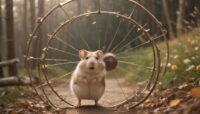Now Reading: Adapt to Change and Thrive
- 01
Adapt to Change and Thrive
Adapt to Change and Thrive

Cultivating Adaptability Thriving in a Changing World
Does the world feel like it’s moving at an impossible speed? From technological breakthroughs to shifts in the global economy, the ground beneath our feet is in a constant state of flux. This relentless pace can leave you feeling overwhelmed, anxious, and worried about being left behind. You might cling to old routines, resist new ideas, and feel a growing sense of uncertainty. The good news is that you don’t have to be a victim of change. The key isn’t to predict the future, but to learn how to dance with it.
This is the power of adaptability. It’s not a rare talent; it is a mindset and a collection of skills that anyone can learn and strengthen. By consciously cultivating your ability to adapt, you can transform anxiety into anticipation and uncertainty into opportunity. This guide will show you why adaptability is so vital and give you practical strategies to build your own resilience. It’s time to stop just surviving change and start thriving in it.
Why Adaptability Is Your New Superpower
In today’s professional world, adaptability has become more important than many traditional skills. For decades, careers were built on deep, specialized knowledge. While expertise is still valuable, the rate of change means that knowledge can become outdated fast. New software and shifting business models require a workforce that can learn, unlearn, and relearn. Employers are no longer just looking for what you know; they are looking for how well you learn and react to the unknown. Being adaptable is your greatest form of career security, making you a valuable asset who can pivot with a company’s needs.
Beyond work, adaptability is key to your mental and emotional well-being. A rigid mindset in a fluid world is a recipe for chronic stress and frustration. When you resist change, you are fighting a battle you cannot win. Cultivating adaptability, however, allows you to maintain a sense of inner balance and control. It empowers you to see challenges not as threats, but as puzzles to solve. This resilient perspective reduces anxiety, fosters optimism, and leads to a more fulfilling life. You become the calm center in the storm, capable of navigating life’s twists and turns with grace and confidence.
The Mindset Shifts for Lasting Adaptability
The journey to becoming more adaptable begins in your mind. The biggest barrier is a fixed mindset—the belief that your abilities are static. To thrive, you must adopt a growth mindset. This is the core belief that you can develop your abilities through dedication and effort. When you see challenges as opportunities to grow, you unlock the door to continuous improvement. A person with a growth mindset says, “I don’t know how to do that yet,” instead of, “I can’t do that.” This simple shift changes your entire approach, replacing fear with curiosity.
Another crucial shift is to embrace imperfection and reframe failure. Many of us are taught to fear failure. An adaptable person, however, sees failure as data. It’s valuable feedback that tells you what didn’t work, so you can adjust your strategy. This requires letting go of the need to be right all the time and instead prioritizing progress. When you separate your self-worth from your immediate results, you give yourself the freedom to experiment, take calculated risks, and explore new things without fear.

Practical Steps to Build Your Adaptability Muscle
Adaptability is like a muscle; it gets stronger with use. One of the best ways to train it is by intentionally stepping outside your comfort zone in small, manageable ways. You don’t need to make a huge life change to build this skill. Start small. Take a different route to work. Listen to a podcast on a topic you know nothing about. Talk to a colleague from a different department. These small acts disrupt your auto-pilot and train your brain to be more comfortable with the unfamiliar.
Another powerful practice is to become a more mindful and reflective observer. We often react without thinking. To build adaptability, take time to pause and reflect, especially after an unexpected event or mistake. Ask yourself powerful questions. What did I learn? What would I do differently next time? What new skill did this challenge me to develop? Keeping a journal to track these thoughts can be very effective. This process turns every experience into a lesson, which strengthens your ability to adjust your course effectively.





































